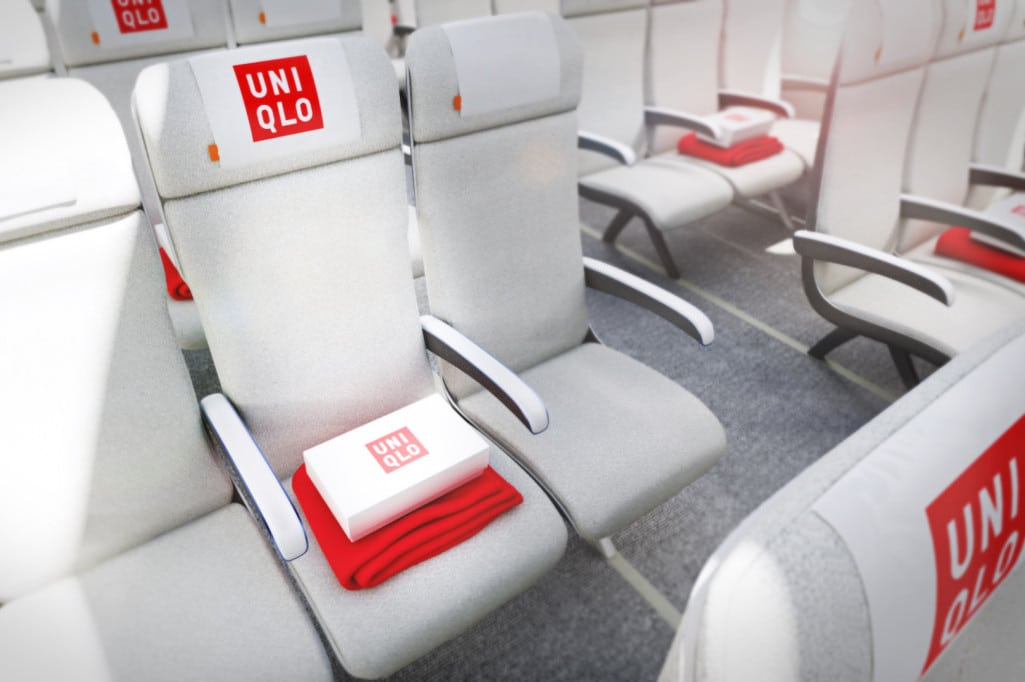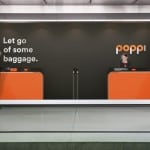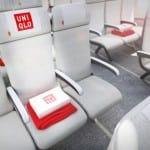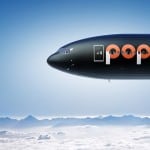Skift Take
Coming up with fresh ideas in aviation takes guts. Sometimes your guts are cut out, and handed back to you on a nicely compartmentalized in-flight meal tray. But there's no stopping some people.
- Drop your bag off before your Poppi flight, on the night train leaving the station in Berlin.
- With a membership model, travellers can exchange flights, tickets, and seats, putting together their ideal itinerary with a few taps of an app.
- With a membership model, travellers can exchange flights, tickets, and seats, putting together their ideal itinerary with a few taps of an app.
- The Middle Seat gets a special treat on Poppi.
- Poppi would offer onboard snacking through on-demand vending machines.
- Poppi’s bold livery reflects its bold vision for air travel disruption.
- Got an aisle and wanted a window? Poppi’s Social Seat Swapping would let passengers exchange seats before the flight.
- Poppi’s click-class customers could have their bags delivered directly to their hotel room.
- Poppies brand is an aspirational and inspirational travel experience focused on eliminating travel’s stress points/TEAGUE
- Poppi’s 707 Fedora bin inspired overhead storage could reduce boarding time by 71%.
- On-the-go travellers on Poppi can opt for click-class, branded practical luggage that clicks neatly under the seat.
- Poppi might break up the cabin by preferred on-board activities, like this cinema class for film-buffs.
- Poppi offers passengers covetable, collectible brand artefacts they want to enjoy off the plane. Some complementary others available for purchase.
- Poppi would push notifications on baggage delivery status to its customers, who are busy relaxing at their destination instead of waiting at baggage claim.
Disruption is booming in the travel industry, with one notable exception: Air travel.
Many would say, and have said, that air travel is broken, but can it be fixed? Can we tear it up and start fresh?
Those are dangerous, blasphemous questions to ask, even if you’ve been helping the aviation industry imagine, design, and deliver a better self, practically from the beginning.
At the Airline Passenger Experience Association Expo in Portland this week, Teague’s Principal Brand Strategist, Devin Liddell, presented an alternative, disrupted future for aviation: Poppi.
To be mild, Poppi was not universally welcome.
That’s because, at its heart, Poppi is a high-concept airline. It is a disruption of today’s airline service which pivots on a consumer-centric brand definition. It aims to resolve common pain points of travel, and to introduce alternative services and revenue sources for airlines. It aims for a win-win that allows airlines to operate profitably—though quite differently—and to give passengers something to look forward to when they take to the skies—something unexpected.
It’s optimistic. It’s hopeful. It’s daring. That’s why the pitchforks are out, and the fires are stoked. A concept like Poppi, some say, must die before it can make trouble.
We asked Liddell, who works with a number of consumer brands and technology companies, as well as in aviation, why the airline industry is so resistant to change, whether that can be fixed, and what it would mean to anyone wanting to fly in the future if it isn’t.
The Mockingjay Airline
Without some disruption, as Liddell sees it, the future of aviation hangs in the balance somewhere between Big Brother and the Hunger Games, tipping on the edge of grim beige-grey commoditization. Poppi, he explains, is Teague’s Mockingjay, a call to action whistled as a gift to the industry, hoping for an echo.
“I totally reject it, but there is a dystopian potential where [aviation] will all devolve into a fully commoditized good,” Liddell says. “The utopian version of that is that disruption will come from new-minded start-ups that basically challenge the status quo.”
Teague expects Poppi to question the establishment. “It’s the same vibe of the Hunger Games, our challenging a very great status quo. That’s why the colors are extraordinarily bright, to project that power.”
“What we want Poppi to be is a really hope-filled innovation,” Liddell adds. “There can be contrarianism embedded in that, but we want Poppi to be a hopeful provocation. We want it to be fresh.”
Fear and Loathing in Disruption
After some viscerally negative reactions at APEX EXPO—which, to be fair, stemmed from industry observers rather than airline representatives—we asked Liddell whether such harsh judgment frightens airlines into inaction.
“The whole notion around Poppi is: Are we ready for disruptive innovation? How do we actually identify and embrace and execute disruptions, when we see them?”
During Poppi’s introduction to the industry, that speculative dialogue led to “an extraordinary knee-jerk response: ‘You can’t do that.’”
But, Liddell says, “This is the whole point of disruption. Disruption is not tidy. If we waited for every regulatory body, every department within an airline, every passenger, and every stakeholder involved in this process to pre-approve something, we would never do anything. Yet, that seems to be where we are. We’re sort of in this mode of burning people at the stake for suggesting the world is round. Instead of thinking, well, maybe it is. Is it round? I think [that reaction] is more felt in the aviation industry than any other industry than I’ve ever been a part of.”
And it’s difficult to have future-vision when you’re looking at everything through the microscopic lens of “the way it’s done” in your industry, Liddell suggests.
“If you narrow focus on one industry, it can become really myopic and you can get very discouraged about how things change–or don’t change,” Liddell says. “That discouragement, that sense of industry-wide discouragement, is a critical force in preventing a shared ‘what-if’ culture. That sort of enthusiasm, and shared optimism is critical for the entire industry, to imagine a future that’s different for the present and the past.”
While some dare to try ideas on for size, airline folk, on the whole, Liddell says, fear rough-shot reactions to innovative suggestions.
“There is an extraordinary amount of fear both of customer backlash, and even internal backlash. There are often times competing interests within a single airline,” Liddell says.
So How Dare Poppi?
“The reason we wanted a name like Poppi is that we wanted something that sounded new and fresh, that didn’t fit the airline frame,” Liddell says. Teague didn’t want another “blank-air.” It wanted to put tech in Poppi’s DNA from the start. “The name itself could be composed of ones and zeros, in a binary language. It’s a tech-centric brand.”
While the power of Poppi is meant to inspire change, and disruption, it reflects Teague’s profound understanding of an industry it’s worked with for generations. It considers the challenges airlines face, takes into account consumer trends, and proposes something that is both aspirational and deliverable.
“Poppi was entirely done as a gift for existing airlines,” Liddell explains. “Teague is not going to start-up Poppi as an actual airline. It’s conceived in respect to airlines. That’s who it’s for. It’s telling currently operating airlines today, ‘here’s a way forward you haven’t even considered.’ It is has hopefully an optimistic posture. It’s not saying what you’re doing is dumb or wrong, but that there are other ways forward.”
POPPI’S 3 DEADLY SINS
Membership
Poppi principally consists of changing the method of delivery for airline service in three important ways.
The first is to change the idea of booking individual tickets entirely, and to consider a membership model for passengers instead—something akin to Amazon Prime membership for airline service.
In an aviation context, this brings the convenient on-demand membership model that the 1% enjoy with private jet service to the 99%. It creates a reliable, predictable cost of service for frequent flyers, and it also gives airlines steady revenue benefits, which can off-set the costs of the other service enhancements Poppi proposes. Liddell also believes the membership model can finally build a bond between flyers and airlines that loyalty programs haven’t really accomplished.
Treats for the Middle
Poppi also faces the harsh reality that there will always be a middle seat, and that with passenger numbers rising that seat will most likely be full. It questions why that needs to be a punitive seat, and proposes that, through brand partnerships, it could be made special. Unique sponsored packages of gifts and only-for-the-middle products, could take some of the sting away, Teague proposes.
Travelling Light
Most controversially, Teague argues that perhaps passengers wouldn’t need to travel like Preppers—lugging their vital worldly goods around everywhere they go, afraid to part with their bags—even when their aircraft is on-fire—less then never see their precious possessions again.
With proper bag digital bag tracking (now taking shape in a resolution put on the books by IATA), and luggage delivered straight to your hotel room, tomorrow’s passengers could instead travel light, bringing only what they really will use onboard.
There is a precedent for this in the dreamier days of air travel, at the dawning of the aspirational jet age, with Fedora bins on 707s.
No one wears Fedoras today—perhaps they’ll wear them again in 2036—but Poppi’s bins leave room for useful things like laptop cases, hand bags, and jackets. Poppi would also sell branded pop-under luggage to customers, which clip under the seat. They’re designed for those on-the-go who travel light.
Social Seat Swapping and Other Disruptions
Beyond these three core concepts, Poppi proposes that passengers could swap assigned seats via a social app, to suit their preferences, or even arrange their own ticket changes by posting booking cancellations and exchanging them for preferred flight itineraries. That and vending machines for on-demand snacking, baggage drops at rail stations, a cinema class, and branded goods that passengers will want to buy, own, and use when they’re back home are just some of the Poppi concepts the Teague team came up with.
The Keeper
Of all of Poppi’s proposals, though, it’s the membership that Liddell would most like to see airlines consider.
“The most important part of Poppi is the idea of membership, of creating the brand that’s actually kind of lovable,” Liddell says. “Those are more important takeaways from it. Yes, the bags could be provocative and challenging, but it was intended to be done in a manner that adds value. But if only one of these ideas could come true I’d hope it was the membership part.”
Daring to Fail
Liddell contrasts the airline industry with the tech industry, which is open to disruption, comfortable with the occasional flop. While a tech company might develop a product, have it fail, shrug that off and develop another, airlines are weary of any misstep.
“There is a lot of fear [in aviation]. One of the other problems that phases into that issue is that, at some level, airlines are all chasing the same passenger. There’s an amplified fear that, ‘if we do it wrong, they’ll go to our competitor.’ That’s one of the things I would point out: something like no bags in the cabin, or even the idea of membership, isn’t going to be for everyone and that is the point. The point of a brand is to actually identify its customers, and having customers who are not part of that brand is basically signs of a healthy brand.”
There’s Always Hope
“If I’m being optimistic, I’m hoping that we won’t go to that commoditized beige/grey future where there’s no branding,” Liddell says. “I’m hoping it will come from start-ups and, perhaps even from a well-backed ‘other’ brand. One of the possibilities of Poppi is that there’s room for either an operator to become this level of brand, or for a brand to arise as separate entity from the operator..[to] run the front end.”
Today’s reactionary culture in aviation aside, Liddell holds firm to his belief in a better future.
“Younger consumers want to be invested participants in a brand’s [prototype concepts], helping create a new future for them. To go back to the hope circling around our entire conversation, I think there’s going to be more of an open embrace of those concepts going forward than there are currently.”
The Daily Newsletter
Our daily coverage of the global travel industry. Written by editors and analysts from across Skift’s brands.
Have a confidential tip for Skift? Get in touch
Tags: amenities, paxex, user experience














